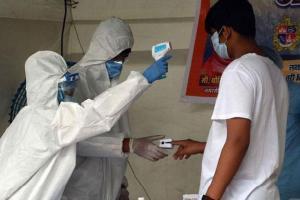Apart from basic healthcare facilities, the pandemic also exposed our country's woefully inadequate support chain for the mentally ill

This picture has been used for representational purpose
 2020 has been that kind of year for almost every one of us - we've been yanked out of our comfort zones as harsh realities have and continue to hit us from all quarters. As India battles the dreaded pandemic that's brought the healthcare system to its knees, it has also exposed many gaps at different levels of how we care for our sick and aged.
2020 has been that kind of year for almost every one of us - we've been yanked out of our comfort zones as harsh realities have and continue to hit us from all quarters. As India battles the dreaded pandemic that's brought the healthcare system to its knees, it has also exposed many gaps at different levels of how we care for our sick and aged.
ADVERTISEMENT
The vulnerability of older people towards this virus has been a huge concern. While many of them who had contracted it were already living with comorbidities, be it heart and lung disease, cancer or liver and kidney ailments, there were others with neurological conditions. We've read heartbreaking accounts of how patients needing timely dialysis or treatment for cancer had to grapple with a crumbling healthcare system, especially in the early months of the pandemic. Those with mental health issues like Alzheimer's, Parkinsonism and dementia faced similar hurdles with lack of access to doctors and attendants. The pandemic thus further exposed the gaping vacuum, of a woefully inadequate support chain for such patients.
Case in point is my father, who's been living with Parkinson's for five years. That we, as a society, aren't equipped, be it in the form of home care experts or specialised centres, has been a shocking realisation even since I had to deep-dive into the scenario as his lone caregiver. Being a progressive neurological condition, round-the-clock assistance is part of his routine. When I had to take a difficult call to move him to an assisted living centre late last year, it required countless phone calls and site visits. There were exorbitantly priced options targeted at the dollar-wielding NRI community, and on the other end, there were trust-driven charity centres that didn't appeal because many, to my surprise, didn't meet even basic hygiene standards or weren't located near hospitals. So where does the middle-class go? After months of legwork and background research, I zeroed in on a space. Much to my relief, he was beginning to settle down, and then the pandemic struck.
Suddenly, the same folks who until then seemed comfortable about managing residents with mental health issues, got jelly-kneed. The attendants simply threw their hands in the air about being unable to tackle their mental imbalance, and some even left the centre. The owners too appeared to be losing patience. The residents, including my father, were unable to comprehend why they couldn't meet their loved ones in person. Few months into the lockdown, and I received the phone call that I was dreading the most. The elder care centre was shutting down since they couldn't manage the scenario, and were afraid that in case a resident contracted the virus, the rest would be at risk. Worse, and this I learnt later, was that committee members of the swish complex where the centre was located had serious objections with the facility in the first place. The second hunt turned out to be doubly numbing, especially since the phases of unlock hadn't begun. Soon, I realised that many such homes had shuttered; while others weren't keen on admitting new residents. So much for the 'Respect our elders' tagline that we Indians flaunt with pride.
After enquiries to at least 20 such spaces within and around the city, and a few visits, I moved him to another facility. In October, he contracted the virus despite being in a secure bubble. The ordeal in a private hospital was another nightmare. Do remember that people with mental health issues are used to having attendants due to their special needs, and such hospitals and COVID facilities aren't equipped to handle such cases. From receiving midnight distress calls from ward boys on how to “handle” my father, to doctors being unable to address specific requests by the next-of-kin [purely because of the caseload in these hospitals], it was a living hell, to put it mildly. When he was finally discharged, 11 days later, traumatised, and weakened by the virus, all one could do is be grateful that the ordeal was over. It took him over a month to return to some sort of normalcy, mentally that is.
If India's healthcare system needed a wake-up call, the virus did that, and hopefully, lessons have been learnt there. But one also hopes that a light is shone on sensitising mental health care support chains simultaneously. Both are organically related to each other, and cannot be looked at in isolation. We certainly don't need another pandemic to remind us of this crater-sized gap.
mid-day's Features Editor Fiona Fernandez relishes the city's sights, sounds, smells and stones...wherever the ink and the inclination takes her. She tweets @bombayana
Send your feedback to mailbag@mid-day.com
Keep scrolling to read more news
Catch up on all the latest Crime, National, International and Hatke news here. Also download the new mid-day Android and iOS apps to get latest updates.
Mid-Day is now on Telegram. Click here to join our channel (@middayinfomedialtd) and stay updated with the latest news
 Subscribe today by clicking the link and stay updated with the latest news!" Click here!
Subscribe today by clicking the link and stay updated with the latest news!" Click here!






